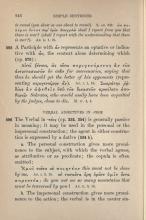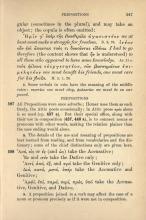596. The Verbal in -τέος (cp. §§ 352, 354) is generally passive in meaning; it may be used in the personal or the impersonal construction; the agent in either construction is expressed by a dative (§ 524.b).
a. The personal construction gives more prominence to the subject, with which the verbal agrees, as attributive or as predicate; the copula is often omitted.
Ἐμοὶ τοῦτο οὐ ποιητέον.
This must not be done by me
Xen. Anabasis 1.3.15
οὐ τοσαῦτα ὄρη ὁρᾶτε ῡ̔μῖν ὄντα πορευτέα;
Do you not see so many mountains that must be traversed by you?
Xen. Anabasis 2.5.18
b. The impersonal construction gives more prominence to the action; the verbal is in the neuter singular (sometimes in the plural), and may take an object; the copula is often omitted.
Ἡμῖν γʼ ὑπὲρ τῆς ἐλευθερίᾱς ἀγωνιστέον.
We at least must make a struggle for freedom.
Demosthenes 9.70
ἰτέον οὖν ἐπὶ ἅπαντας τούς τι δοκοῦντας εἰδέναι.
I had to go therefore to all those who appeared to have some knowledge. (the context shows that ἦν is understood)
Plato Apology 21e - 22a
τοὺς φίλους εὐεργετητέον, τῶν βοσκημάτων ἐπιμελητέον.
One must benefit his friends, one must care for his flocks.
Xen. Memorobilia 2.1.28
c. Some verbals in -τέος have the meaning of the middle voice.
πειστέον one must obey
φυλακτέον we must be on our guard.


